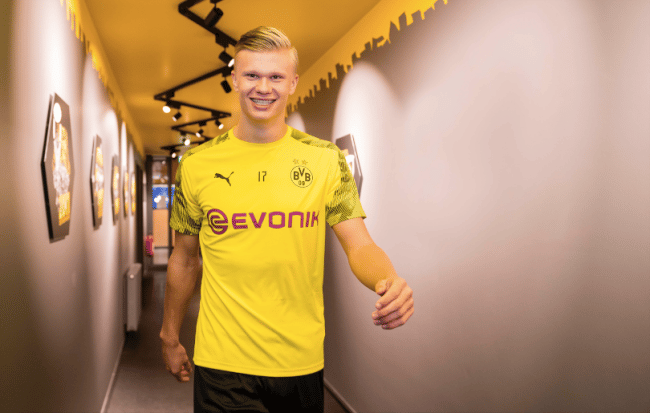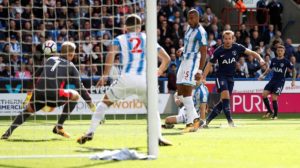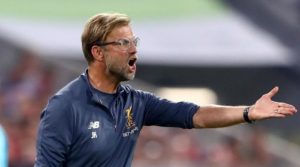Norwegian international Erling Haaland explains how he shrugs off the pressure of a record-breaking season.
Erling Haaland has a confession to tell FourFourTwo. Ever since he was a small child, he’s had a problem, and it’s only getting worse. Every single day, it’s on his mind. Every time he steps onto a football field, it totally consumes him.
He must score goals. He needs to score goals.
Over the past 10 months, his goalscoring has hit ludicrous levels. Hat-tricks have become a regular occurrence. In one match, he scored a ridiculous nine times. But it will never be enough. He will always want more.
‘I think I’m addicted…’ reveals Haaland, bursting into laughter. ‘It’s a good addiction!’
So far, it’s an addiction that has turned the 19-year-old striker into arguably the most exciting teenager in world football. Rarely has a player so young produced a year quite like this – a year that has transformed him from a Red Bull Salzburg reserve into one of German football’s biggest stars, via serious interest from Manchester United.
Haaland scored eight times in his first four games for Borussia Dortmund. Those eight strikes for BVB came from a total of 181 minutes, or the equivalent of two full matches. By the time of the season’s unexpected hiatus, he had scored 40 goals in just 33 games.
Every player in Europe would love to post those sorts of numbers, and they’re not the only ones who are envious. As the Norwegian marksman arrives to greet FFT, there’s a stark message on his T-shirt. ‘The devil is jealous of me,’ it reads.
‘You like it?’ asks Haaland. ‘I know the devil has been jealous about me my whole life…’ The devil and everyone else for that matter, we suggest, prompting a chuckle from the teenage talent. ‘But especially him,’ he adds, smiling but elaborating no further.
As we sit down to chat, it quickly becomes clear that Haaland speaks almost exclusively in one-liners, many of which are delivered with a deliberate air of mystery about them, accompanied by a mischievous twinkle in his eyes. Haaland is different on the field and he is different off it.
He doesn’t play the media game by its normal rules, using a flurry of meaningless media-trained clichés – words for the sake of words. Long sentences are not for Erling Haaland. He wants to have fun; to give a hint of his personality and intelligence while remaining enigmatic.
When he hit a hat-trick on his Champions League debut for Salzburg against Genk in September, in the first game of a group that also contained holders Liverpool and Napoli, the post-match interview became famous for its brevity.
‘How are you feeling?’
‘Very good.’
‘What’s the secret? Seventeen goals now in nine games…’
‘To work hard.’
‘Your father scored at Anfield in 1997 – are you going to follow suit?’
‘I hope so.’
Each answer came with a trademark wry smile. Haaland’s brevity appears to come not from shyness, but supreme confidence. He has turned interviews into a sport; a friendly battle of wits with the journalist. It’s reminiscent of the man he calls his idol: Zlatan Ibrahimovic.
‘I like his mentality and how he sees different things,’ Haaland tells FFT. ‘I think I’ve always had that confidence, too – that’s just me. I also like how he moves from one club to another, in another country – which isn’t easy – but he always comes in and just bangs in goals, from the first second. I liked seeing that.’
Moving to a new club in another country and banging in goals from the first second? That sounds familiar… ‘It’s good!” laughs Haaland, pleased that we’ve pointed out the similarity, almost as if he was deliberately leading us towards it.
Has he ever spoken to Zlatan? ‘No, but we will see what the future brings,’ he says.
The two players now share an agent, Mino Raiola – maybe he could ask Mino about arranging something? ‘We’ll see!’ he replies, laughing. Then he emphasises that he doesn’t see his on-field game as an identikit Ibrahimovic.
The Norwegian’s approach is based around pace, movement and breaking clear of the last line of defence. ‘We’re both strikers and we’re both tall,’ explains the 6ft 4in forward. ‘But we have a different game. It’s hard to compare us. I am who I am.’
The player most likely to succeed Zlatan as Scandinavia’s next big star was actually born in Leeds. It was there that his father, Alfie Haaland, and mother Gry Marita Braut, a former athlete, resided when baby Erling arrived in July 2000. A month earlier, dad had signed for Manchester City from Leeds United, after a previous spell at Nottingham Forest – the club he represented when he appeared for Norway at the 1994 World Cup.
By 2003, still only 30 years of age and not helped by an infamous challenge from Roy Keane at Old Trafford when Erling was just nine months old, Alfie retired from football. Soon, he moved the family back to his home town of Bryne in south-west Norway.
‘I was turning four years old,’ says Erling. ‘We lived in Leeds, and when I see pictures of me in kindergarten, I get some memories, but I don’t remember much about England.
‘When he was playing there, I was far too young to realise he was a footballer. When I was about five or six, I knew that he played in the Premier League and for the Norwegian national team. He’s told me a little bit about it, and I’ve seen clips of his goals – actually quite nice goals!’
His dad has never shown him a clip of the Keane tackle. ‘No,’ he says, understandably not wanting to dwell on that particular topic. Although he doesn’t remember his father’s games for Manchester City and wasn’t even born when Alfie played for Leeds, he admits to having a soft spot for both teams. Older brother Astor has previously posted a picture online of baby Erling in a City shirt, and Erling himself once declared that his dream was ‘to win the Champions League with Leeds’. He says he now has a new aim – to do it with Borussia Dortmund.
‘That would be a very nice dream…’ he says, smiling, before explaining his affiliation with Leeds and Manchester City. ‘My father played for different Premier League teams, so of course you become a fan. You support them because you support your dad.’
As the son of a Norway international, Erling and his footballing development started to attract attention. ‘Because I’m his son, there was always some pressure, but I liked that,’ he says. ‘It has always been a motivation to become better than him, and to live the life he lived – to live off football. That’s possibly the best job you can have.’
His father has been there to help him every step of the way – even if Erling didn’t end up following Alfie into midfield. ‘I have always been an attacker,’ he insists. ‘To be honest, it’s more fun to be a striker than a defensive midfielder! We’ve always talked a lot about football, though, ever since I started playing. We still do. For my whole life, he has been a big role model.’
Haaland quickly showed genuine promise. Called into the international setup at youth level, he gained huge confidence with a goal from the halfway line, directly from kick-off. ‘Yeah, that was a really nice one,’ he says. ‘That was in 2015, for Norway Under-15s. It’s maybe the nicest goal I’ve ever scored.’
His confidence was also growing off the pitch: a year later, he and two of his Norway team-mates created a tongue-in-cheek rap video while on international duty and posted it on YouTube. It now has nearly 3.5 million views – ‘because it’s a nice video!’ he says. Erling, Erik Botheim and Erik Tobias Sandberg called themselves the Flow Kingz, and are still close pals today.
Haaland adds, ‘We were with the national team, U16s or U17s. We’d had a really long day and had nothing to do, so we decided to make a rap video. I think my football skills are quite a lot better, but my rap skills? They’re not too bad…’ Needless to say, his Dortmund teammates have played it in the dressing room. ‘I think they liked it,’ says the striker with a big grin.
Haaland had made his club debut for Bryne aged 15. He didn’t score in 16 appearances in Norway’s second tier, but his encouraging displays – mostly as a substitute – earned him a move to top-flight club Molde in 2017. There, he linked up with manager Ole Gunnar Solskjaer – arguably the finest finisher in the history of Norwegian football.
‘I arrived at Molde as a young kid, and he helped me a lot,’ explains Haaland. ‘He was a good finisher, and helped me with striking skills and different finishing methods. He’s been important in my career.’
It was under the Baby-Faced Assassin that Haaland’s goalscoring took off at senior level – having shot up in height, to such an extent that team-mates nicknamed him ‘Manchild’. The key moment came in a fixture at Brann, midway through the 2018 campaign. Before that, Haaland had netted only four league goals in 42 senior appearances. He faced the unbeaten league leaders, who had conceded just five goals in 14 games, and then scored four goals within 21 minutes of kick-off.
‘That game was important for my career,’ admits Haaland. ‘I’d had a tough pre-season and I was ill for a long time, but I remember that match like it was yesterday.” When we ask what memories he has, we get a literal answer. ‘Scoring four goals…’ he replies. ‘It was a good feeling! After that game, I found out how to score more.’
The next three games produced three more goals, and by mid-August he had agreed to join Salzburg on January 1, 2019, for £4.5m. There had been interest from Leeds, Bayer Leverkusen and even Italian giants Juventus, but the Haaland family believed that Salzburg were the ideal next step for his development: they had previously helped Sadio Mané and Naby Keita progress to bigger things.
‘It was a perfect move,’ he reflects. ‘In the first half of the year I trained a lot and didn’t play much, but then the summer arrived and I just didn’t look back. There was a new manager who helped me a lot: Jesse Marsch was fantastic to me.’
An 18-year-old Haaland had made just two league appearances in his first half-season with Salzburg, but then he went away to the Under-20 World Cup in Poland. Losing their first two group matches against Uruguay and New Zealand, Norway were eliminated from the tournament without Haaland finding the net.
Their final match was a dead rubber, but it earned the forward worldwide attention: Norway beat Honduras 12-0, and Haaland scored nine times. Despite scoring in just one game, he bagged the Golden Boot with more than twice as many goals as anybody else.
‘It was a nice game,’ he says with a smile. ‘I’d scored that many goals in a game when I was younger – I don’t remember how many the most was, but I scored a lot when I was young. When I got nine, I had this feeling of ‘I’m still young’. It was a fantastic night.’
Even when he scored nine, Haaland felt he could have had more. ‘VAR stopped me!’ he laughs. ‘If VAR was on my side, I would have maybe got 11, so it was a bit disappointing…’
When he went back to Salzburg, Haaland kicked off the 2019-20 campaign with three goals in the first round of the Austrian Cup. Two league trebles had followed by the time his Champions League debut rolled around in mid-September. It was a game Haaland had dreamed about for years.
A teammate later revealed that the day before the home match with Genk, Haaland had been playing the Champions League theme tune while driving around in his car.
‘Well, you know, you like the song?’ asks Haaland. ‘I love it, so I put it on. I had been looking forward to the game for a long time.’
It was also Red Bull Salzburg’s debut in the group stage, after more than a decade of falling short in the competition’s qualifying stages. Haaland made sure it was a night to remember. He opened the scoring inside two minutes and completed his hat-trick before half-time as Salzburg gubbed Genk 6-2.
He was the third-youngest player ever to score a hat-trick in the Champions League, after Wayne Rooney and Raul. ‘But next time I can’t celebrate my first goal for so long,’ he recalls, laughing. ‘After the celebration I was dead – I had to take it easy!’
A couple of weeks later, Erling followed in his father’s footsteps by scoring at Anfield, four minutes after coming off the bench. It levelled the game at 3-3 after Salzburg had trailed 3-0, but Liverpool eventually triumphed 4-3. Haaland says, ‘He’d told me a lot of times, “I scored at Anfield, so I think you also have to do this”. Then the opportunity came, and I took it. So now we’re even.’
Goals continued to flow: two at home to Napoli, one away at Napoli, and one away at Genk. In five appearances – only three of them from the start – Haaland had hit eight Champions League goals. He’d also added another hat-trick in the Austrian league, for his fifth matchball of the season.
‘They lie in bed and I sleep well with them,’ he told the Norwegian press. ‘They are my girlfriends.’ Presumably he was only joking… right? ‘You can think whatever you think about it,’ he says, attempting the mysterious approach, but we’re still curious – did he? ‘Er, yes, one night I actually had the ball sleeping beside me…’ he giggles.
By that point, a host of top clubs wanted to recruit Haaland, who had an enticing £18m release clause in his Salzburg contract. Agent Raiola later confirmed that he held talks with a dozen different clubs. Among those linked were Juventus again, Barcelona, Real Madrid, RB Leipzig, Manchester City and Manchester United, now managed by Haaland’s former Molde boss, Ole Gunnar Solskjaer.
Haaland carefully considered his options – consulting with his father and with Raiola – and decided that Borussia Dortmund would be the smartest move for his career. As with Red Bull Salzburg, BVB’s record of developing youngsters – Jadon Sancho, Christian Pulisic and Ousmane Dembele among them – went in their favour.
When they met up for talks, the Bundesliga giants also showed Haaland a video of their famous Yellow Wall. ‘I’d seen it before that, of course, but they showed me – all the fans are amazing here,’ he explains.
‘I had a very good feeling about Dortmund from the first moment, and that’s why I’m here. I liked the whole club, the history, the people in the club and how they run it. We decided Dortmund was the best option. And it is.’
Haaland is reluctant to discuss Manchester United’s interest, and whether he spoke to Solskjaer. ‘I don’t talk about that; I can talk about me and my club,’ he says firmly, while admitting he was flattered by their interest: ‘It’s always nice when clubs are interested. It means you’ve done something right.’
His Bundesliga debut came as a substitute at Augsburg as BVB trailed 3-1. Within three minutes, he had scored. Within 23 minutes, he had a hat-trick. Dortmund won 5-3.
‘I could never have expected how things started,’ confesses Haaland. ‘The manager just told me to go on and make a difference… and I did.’
A week later, he scored twice at home to Cologne: his first goals in front of the Yellow Wall. The week after that brought two more against Union Berlin, meaning he had scored seven in his first three outings, from his first seven shots on target as a Dortmund player. Another goal followed at Werder Bremen in the German Cup, then another at home to Eintracht Frankfurt in the league.
Are we at a stage where he is disappointed if he doesn’t score two or more in a game?
‘We are disappointed!’ Dortmund’s media officer jokingly interjects from the back of the room. ‘Perhaps he will be, but no, no, no…’ Haaland laughs. ‘The most important thing is to achieve something with the team,’ he says.
‘We’re capable of everything. The start here has been absolutely fantastic, and the club have helped me a lot – it’s not easy to come to a new place in the middle of the season. I already feel at home.’
But Haaland insists he isn’t surprised that he has continued to score goals this season. ‘Not really, because I’ve been doing this my whole life,’ he asserts.
‘It’s what I wanted to do when I was older. It’s what I do. I always knew I’d be a good player, but things have been going fast. I like that speed!’
Haaland was January’s Bundesliga Player of the Month after just 59 minutes of league football – he is realistic enough to know that every season may not be quite like this one. He is also prepared for any setbacks he may face. But Haaland believes that he can be the best striker in the world one day. ‘Of course,’ he says. ‘It would be nice, wouldn’t it?’
First, he hopes to help Borussia Dortmund challenge for honours, before rounding off the season by appearing for Norway at Euro 2021. He picked up his first two senior caps in early September but missed the next two international breaks with injury, and an awful lot has happened since then; he hadn’t even made his Champions League debut at that time. He could be rather harder to stop in the League C play-offs, which should have taken place in March.
Still without a new date attached, Norway host Serbia in the semi-finals, and will then have another home tie against either Scotland or Israel should they progress. If they reach the Euros they will take on England – a country Haaland could have represented.
Norway haven’t participated at a major tournament for 20 years, and he is keen to put that right. ‘Very keen,’ he says. ‘Serbia are a good team, but we have a fair chance.’
His father won 34 caps for Norway. Erling has set himself a target to better that figure. The childhood dream of surpassing his dad still drives him. In fact, is he there already? ‘No, no,’ he insists. ‘But hopefully one day.’
Either way, he is on the right path. ‘I am,’ he says, smiling as we shake hands and end our chat. In an unusual, often monosyllabic way, he has been engaging company. Erling Haaland is good, and he knows it.
Days after we meet, he scores another two goals in the Champions League last 16 at home to Paris Saint-Germain. Dortmund may have lost the second leg, but the reactions of PSG players in their celebrations – taking the opportunity to mock Haaland – only raise Haaland’s stature.
If he can have a season like this at the age of 19, the years ahead could be very special indeed.





